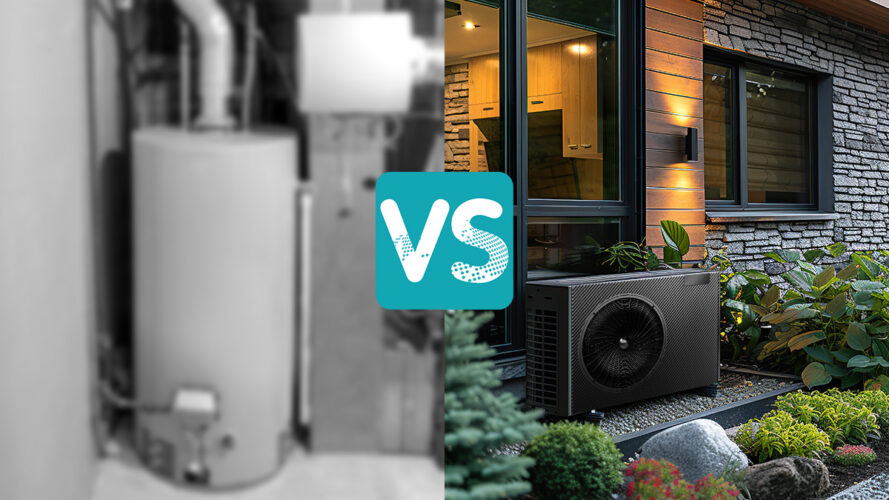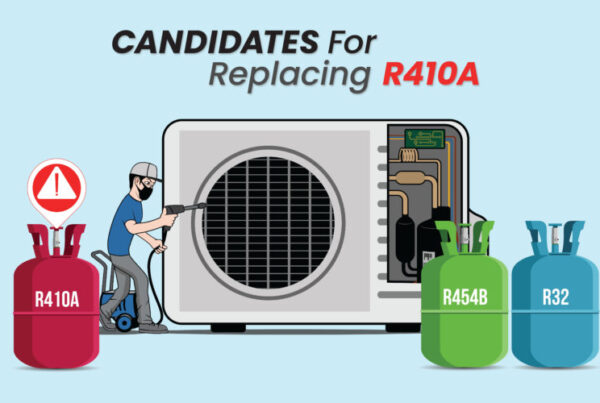
When it comes to heating your home, the choice between a residential heat pump and a traditional gas boiler can significantly affect your energy efficiency, environmental impact, comfort, and your wallet. Here, we’ll compare these two systems, highlighting their differences, advantages, and potential savings to help you make an informed decision.

Understanding the Basics
Heat Pumps
-
Dual Capabilities
Heat pumps are an innovative HVAC solution that transfers heat between home and the outdoors. They can function as a heating and cooling system, making them quite versatile for year-round use. In winter, they extract warmth from outside air, water, or ground and bring it indoors. In summer, they reverse the process, easily removing heat from your home.
-
Unmatched Efficiency
Heat pumps are renowned for their exceptional efficiency, achieving levels over 300%. This means they produce three units of heat for every unit of electricity consumed, as they simply transfer existing heat rather than generating it through a process of combustion.
Gas Boilers
-
Traditional but Limited
Gas boilers are common, dedicated heating systems that burn natural gas to produce heat. This heat warms water, which circulates through radiators or underfloor heating systems to heat your home. While effective at providing consistent warmth, gas boilers are limited to heating only and do not offer cooling capabilities.
-
Efficient, but not Enough
Even the most efficient gas boilers max out at around 90% efficiency, meaning 10% of the energy used to produce heat is lost during the process. While 90% is quite efficient for a combustion-based system, it pales in comparison to the efficiency of heat pumps.

The Environmental Impact
Heat Pumps
-
Significantly Lower Emissions
Heat pumps can reduce gas emissions by up to 80%. Since they rely on electricity and do not burn fossil fuels directly, their operation is much cleaner, especially when paired with renewable energy sources like solar or wind power.
Gas Boilers
-
High Carbon Footprint
Gas boilers produce approximately 2.2 tonnes (2.43 U.S. tons) of CO2 per year, contributing significantly to greenhouse gas emissions and further accelerating climate change due to the burning of fossil fuels.
Initial Costs and Long-Term Savings
Heat Pumps
-
Higher Initial Cost, Greater Savings
While the initial cost of installing a heat pump can be higher than that of a gas boiler due to the complexity of the system and the need for both a small indoor and outdoor unit, the long-term savings on energy bills can actually offset the initial investment.
Gas Boilers
-
Lower Initial Cost, Higher Running Expenses
Gas boilers typically have a lower initial installation cost compared to heat pumps. However, their running costs can be higher due to lower efficiency and the fluctuating price of natural gas. Over time, these costs can add up significantly.
The Bottom Line: Why Choose a Heat Pump Over a Gas Boiler?
When choosing between a heat pump and a traditional gas boiler, consider the following key points:
- Efficiency: heat pumps are significantly more efficient than gas boilers, potentially saving you money on energy bills.
- Environmental Impact: heat pumps can drastically reduce your home’s carbon footprint.
- Cost: while heat pumps have a higher initial cost, long-term savings and potential tax incentives can make them more economical.
- Versatility: Heat pumps offer the convenience of both heating and cooling in just one system.

In summary, a heat pump makes an excellent choice for an energy-efficient, environmentally-friendly, and versatile solution for home heating and cooling. While the initial investment may be higher, the long-term benefits make it a wise decision for the future.
Additionally, many regions offer tax incentives and rebates for installing energy-efficient systems like heat pumps, further reducing upfront costs.
Make the switch to a heat pump and experience enhanced comfort, efficiency, and savings.
To learn more interesting facts about heat pumps, you’re invited to take a look at Dalrada HOME’s videos and blogs. For additional information or to get in touch with a heat pump specialist, please contact us today.



